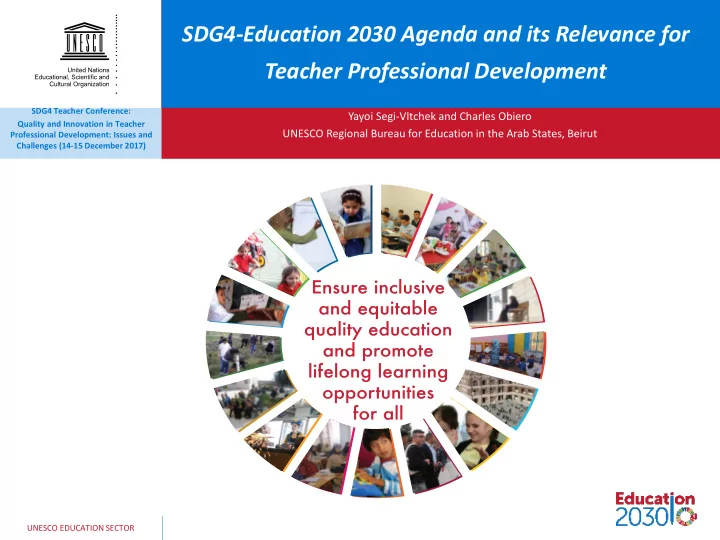

SDG4-Education 2030 Agenda and its Relevance for Teacher Professional Development SDG4 Teacher Conference: Yayoi Segi-Vltchek and Charles Obiero Quality and Innovation in Teacher UNESCO Regional Bureau for Education in the Arab States, Beirut Professional Development: Issues and Challenges (14-15 December 2017) UNESCO EDUCATION SECTOR
Contents of Presentation • Education in the 2030 Agenda and teachers in SDG4 • Education 2030 Framework for Action • Food for thought: What does data say about learning and teachers? UNESCO EDUCATION SECTOR 2
Education in the 2030 Agenda Goal 4 : Ensure inclusive and equitable quality education and promote lifelong learning opportunities for all Outcome Targets [7] Means of implementation [3] 4.1 Quality primary/secondary education for all 4.a Safe & inclusive learning environments 4.2 Early childhood & pre-primary education 4.b Scholarships for higher 4.3 Equal access to TVET & higher education education 4.4 Relevant skills for work 4.c Teachers ’ training and working conditions 4.5 Gender equality & equal access for all 4.6 Youth and adult literacy 4.7 Global citizenship education for sustainability UNESCO EDUCATION SECTOR 3
UNESCO EDUCATION SECTOR 4
FIVE STRATEGIC APPROACHES • Strengthening policies, plans, legislation and system (teacher data as part of EMIS) • Emphasizing equity, inclusion and gender equality (teacher availability; teaching materials; teacher training on inclusive education, etc.) • Focusing on quality and learning (learner- centered, active and collaborative pedagogical approaches; teacher policies and regulations; assessment, etc.) • Promoting lifelong learning (quality educators in post-basic education levels) • Addressing education in emergencies (teacher preparedness, support and training) UNESCO EDUCATION SECTOR 5
KEY MESSAGE: ACCOUNTABLE TEACHERS Teachers have primary responsibility for • providing high-quality instruction , but they are expected to do far more than teach . Student test scores and classroom observation • form part of teacher evaluations. But the time and capacity development required to ensure it generates useful feedback to improve teacher effectiveness should not be underestimated. Professional learning communities are an • accountability approach that has helped increase teachers ’ pedagogical and content knowledge, with associated changes in practice. But they are less common in poorer settings, where mentoring and collaborative practices can be rare.
What does data say about learning and teachers? 93 85 84 84 81 79 74 % of Population 68 68 67 66 62 60 (25 years and 56 55 50 49 above) who have 44 44 42 41 39 attained level of 30 30 23 21 education 19 16 11 BAHRAIN IRAQ JORDAN KUWAIT OMAN PALESTINE QATAR SAUDI ARABIA primary lower secondary upper secondary tertiary 120 100 80 60 40 Youth and Adult 20 Literacy Rates, 0 2010-2016 Bahrain Egypt Iraq Jordan Kuwait Libya Morocco Oman Palestine Qatar Syrian Tunisia Arab Republic Youth literacy rate Adult literacy rate UNESCO EDUCATION SECTOR 7
What does data say about learning and teachers? Reading Mathematics 98 95 95 93 % of pupils in early 72 65 64 61 primary grades (2 or 3) 58 50 46 achieving at least 43 41 minimum proficiency 19 level, 2010-2015 (Source: GEM Report, 2017/18) Bahrain Jordan Morocco Oman Qatar Saudi Arabia Sudan Syrian Arab Republic Reading Mathematics 75 60 54 52 51 48 % of pupils in end of lower 47 45 43 41 41 40 secondary education 34 32 30 28 25 achieving at least 21 19 minimum proficiency level, 2010-2015 (Source: GEM Report, 2017/18) Algeria Bahrain Egypt Jordan Kuwait Lebanon Morocco Oman Qatar Saudi Syrian Tunisia United Arabia Arab Arab Republic Emirates UNESCO EDUCATION SECTOR 8
100 The teachers in our school co- operate by exchanging 90 ideas or material when teaching specific units or series of lessons 80 Our school invites specialists 70 to conduct in-service training for teachers 60 50 Our school organises in- 40 service workshops that deal with specific issues that our 30 school faces 20 Our school organises in- service workshops for specific 10 groups of teachers 0 United Arab Qatar Jordan OECD average Lebanon Finland Algeria Tunisia Emirates UNESCO EDUCATION SECTOR 9
Thank you! Learn more on SDG4-Education 2030 in the Arab States http://www.education2030-arab-states.org/ UNESCO EDUCATION SECTOR 10
Recommend
More recommend